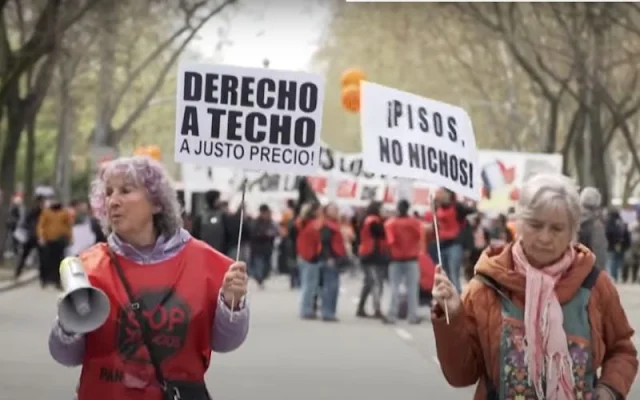 |
| Tens of thousands of citizens rallied across Spain to protest rising rents and vanishing rental options. |
Spain Gripped by Nationwide Protests Over Housing Crisis Fueled by Tourism and Soaring Rents
DECK
Demonstrators flood 40 cities, demanding action on unaffordable housing, mass evictions, and a rental market distorted by tourism and speculation—government warns of a "social emergency."
KEY FACTS
-
What: Massive protests across Spain demanding housing reform.
-
Where: Demonstrations took place in 40 cities including Madrid, Barcelona, Seville, and Valencia.
-
When: Saturday, April 5, 2025.
-
Why: Skyrocketing rents, housing shortage, and rise in short-term tourist accommodations.
-
How: Activists, unions, and residents organized marches and rallies.
-
Participants: Over 150,000 in Madrid alone, according to local tenants’ unions.
-
Response: Government acknowledges crisis and proposes new housing law and construction incentives.
SITUATION SNAPSHOT
Keychains rattled and chants thundered through downtown Madrid as crowds surged through its avenues, protesting what many call the worst housing crisis in decades. Residents waved banners demanding protection from evictions and denouncing tourist flats that have replaced long-term homes. Amid glimmering hotel lights and shuttered rental buildings, the clash between economic growth and housing access took center stage.
WHAT WE KNOW
Tens of thousands of citizens rallied across Spain to protest rising rents and vanishing rental options. The unrest stems from a decade of housing pressures, with average rents doubling and house prices soaring 44%, even as incomes have largely stagnated. The number of available long-term rentals has plunged by 50% since the pandemic.
Data from property portal Idealista illustrates the rapid decline in rental supply, while landlords are increasingly opting for short-term stays due to better profits and fewer regulations. Many demonstrators accused property owners of deliberately neglecting maintenance to pressure tenants into leaving.
The Spanish central government now officially recognizes the housing crisis as "a social emergency." The Ministry of Housing estimates the nation needs between 600,000 and one million new homes within the next four years. Only 100,000 homes were completed in 2024, down from over 600,000 during the 2007 housing boom. Experts blame high building costs, limited land, and a labor shortage for the slowdown.
WHAT’S NEXT
City halls across Spain are moving to limit new permits for tourist rentals, with Barcelona committing to revoke licenses for all 10,000 registered short-term flats by 2028. The central government has introduced a new housing law targeting overheated markets—known as "high-tension" zones—by capping rent increases and allocating public land for affordable housing.
The effectiveness of these measures remains contested. Although Catalonia has seen a 3.7% drop in rental prices since the cap took effect—6.4% in Barcelona—critics argue the law has driven landlords to pull thousands of units off the market. The rental cap is currently in effect only in select regions like the Basque Country, Navarre, and Catalonia due to political resistance.
Further legislative reforms and local restrictions are anticipated, especially in tourist-heavy regions like the Canary Islands and Balearics, where anti-tourism protests have intensified.
VOICES ON THE GROUND
"No matter who governs, we must defend housing rights," cried demonstrators in central Madrid.
"They're kicking all of us out to make tourist flats," said Margarita Aizpuru, 65, from Lavapiés, where nearly 100 families face eviction.
"It cannot be that to live in Madrid you need to share a flat with four others," shared Wendy Davila, 26.
"The current rental bubble is encouraging a lot of big owners to do what they are doing here," warned Blanca Castro. "Which is to get rid of the current tenants who have been here a long time, in order to have short-term tourist flats, or simply to hike up the rent."
At a public housing ceremony in Seville, Prime Minister Pedro Sánchez declared that Spaniards "want us to act, they want the housing market to operate according to the law of reason, of social justice, not the law of the jungle; they want to ensure that vulture funds and speculators are not doing whatever they like."
CONTEXT
Spain welcomed a record 94 million tourists in 2024, fueling the economy but straining housing infrastructure. Alongside immigration-driven labor growth, this has deepened the housing shortage. Currently, only 3.4% of housing in Spain is public or social—one of the lowest rates in Europe.
While the government is incentivizing construction by allocating land and preventing public housing from entering the private market, housing development remains sluggish compared to demand. Past property bubbles and the financial crash of 2008 continue to shape today’s cautious investment landscape.
Local administrations in tourist-heavy regions have started targeting short-term rentals, a major contributor to rental inflation. The housing crisis is now central to Spain’s political discourse, with the Socialist-led government under pressure to deliver both rapid relief and long-term reform.
REPORTER INSIGHT
Inside a deteriorating apartment near Madrid’s Atocha station, Blanca Castro dons a helmet before entering her water-damaged kitchen—now unusable, with a gaping hole in the ceiling. Like many others, she prepares meals on a camping stove and washes dishes in the bathtub. Her story echoes across Spain, where too many are living in fear of eviction or battling unlivable conditions, while property owners chase tourist profits. Amid economic boom, these protests mark a reckoning with the country’s housing inequality.





 Get it on Google Play
Get it on Google Play



0 Comments